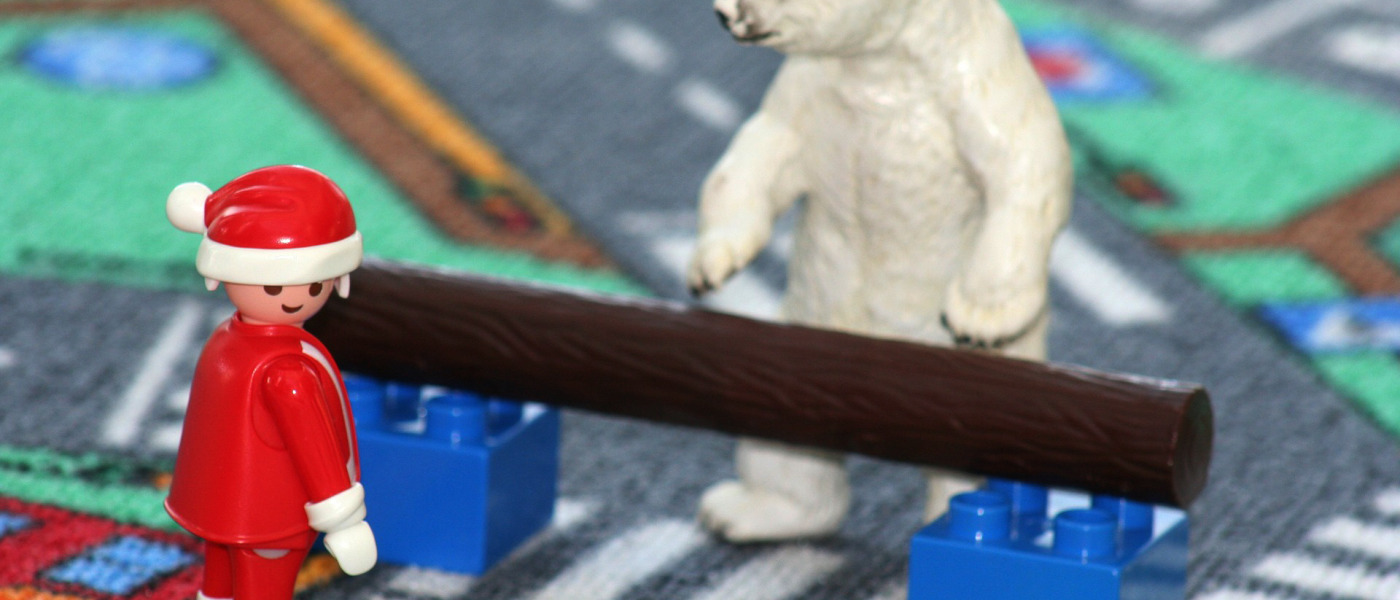Short, Sweet, Fun and Fresh: Great Games for Practicing Speech Sounds at Home
 This blog post is for parents who would prefer not to sound like Ben Stein’s class in the iconic John Hughes’ comedy from the 1980’s, Ferris Bueller’s Day Off. “Anyone…anyone?” As your child moves through his or her speech therapy goals, being involved for even a few minutes, three to five times per week, can be enormously beneficial. This is especially true when your child is in the process of practicing a new speech or language behavior that he has learned, but has not yet mastered. Because our children have a lot on the plates, and we as parents don’t want to overwhelm them, I recommend embedding this home-based speech practice into what they already are doing. This often takes the form of games or other overtly play-based activities, as opposed to worksheets, books or anything that could be construed as “work.” Since each age group tends to have different play interests, this post is organizes the choices of games for practicing speech sounds according to age, from birth to age 3, preschool age (age 3 to 5), school age (age 6 to 9), and pre-adolescents (age 10 to 14).
This blog post is for parents who would prefer not to sound like Ben Stein’s class in the iconic John Hughes’ comedy from the 1980’s, Ferris Bueller’s Day Off. “Anyone…anyone?” As your child moves through his or her speech therapy goals, being involved for even a few minutes, three to five times per week, can be enormously beneficial. This is especially true when your child is in the process of practicing a new speech or language behavior that he has learned, but has not yet mastered. Because our children have a lot on the plates, and we as parents don’t want to overwhelm them, I recommend embedding this home-based speech practice into what they already are doing. This often takes the form of games or other overtly play-based activities, as opposed to worksheets, books or anything that could be construed as “work.” Since each age group tends to have different play interests, this post is organizes the choices of games for practicing speech sounds according to age, from birth to age 3, preschool age (age 3 to 5), school age (age 6 to 9), and pre-adolescents (age 10 to 14).
Birth to 3

 Speech and language therapy is highly play-based for this age group. The goals of therapy are often explicitly worded around play (e.g. “Johnny will combine 2 words into short phrases, where pragmatically appropriate, with 80% accuracy, in play activities”). The therapist is essentially embedding therapy within play, rather than vice versa, which is reserved for preschool kids and older. For this youngest age group, it is especially important for a parent to observe — ideally once per month — a good portion of a therapy session, to see exactly how the therapist is embedding goals into play. Try to learn the basic structure of the play, you won’t be as skillful in this as your therapist – after all she or he is trained and experienced! – but you can get the basics. For example, if play revolves around building a tower out of blocks and the current high priority goal is to have the child combine two words into phrases, watch how the therapist cues your child. The cue might come in the form of a question (e.g “do you want more blocks?”), with the child expected to answer in a two-word phrase (e.g. “more blocks”). If the child is just beginning to show this skill, the therapist may cue the child to imitate via a statement while showing the child that, momentarily, more blocks require the child to at least attempt to say, “more blocks.”
Speech and language therapy is highly play-based for this age group. The goals of therapy are often explicitly worded around play (e.g. “Johnny will combine 2 words into short phrases, where pragmatically appropriate, with 80% accuracy, in play activities”). The therapist is essentially embedding therapy within play, rather than vice versa, which is reserved for preschool kids and older. For this youngest age group, it is especially important for a parent to observe — ideally once per month — a good portion of a therapy session, to see exactly how the therapist is embedding goals into play. Try to learn the basic structure of the play, you won’t be as skillful in this as your therapist – after all she or he is trained and experienced! – but you can get the basics. For example, if play revolves around building a tower out of blocks and the current high priority goal is to have the child combine two words into phrases, watch how the therapist cues your child. The cue might come in the form of a question (e.g “do you want more blocks?”), with the child expected to answer in a two-word phrase (e.g. “more blocks”). If the child is just beginning to show this skill, the therapist may cue the child to imitate via a statement while showing the child that, momentarily, more blocks require the child to at least attempt to say, “more blocks.”
I recommend picking a new activity that you are confident your child will love that is different from the activities you observed your therapist using. Young children thrive in routine. Play, which is really a young child’s work, also functions according to routine. If a child associates a certain toy or activity with a therapist, the child is more likely to not consistently accept the parent’s way of playing with that toy. So, ask your therapist what other materials or activities can successfully target the goal and if possible, have the therapist observe you briefly playing with your child as you target this goal. This new activity can be your own and your child should quickly associate it with you.
Sibling Bonus?
If the child working to build his speech and language skills has an older sibling, I recommend enlisting the help of that older sibling. The younger sibling not only often “worships” the older sibling, but the older sibling is likely to present a strong speech model for the younger one. I recommend asking your speech therapist to provide the goal you’re working on as well as a handful of stimulus items to guide the older sibling’s involvement here. Also, it’s very important to incentivize the older sibling with some classic bribery (e.g. an ice cream party, a trip to the bookstore, etc.).
Preschool (Ages 3 to 5)
With preschoolers, play is still an important part of therapy and with that, I prefer parent-driven, home-based activities to model this. But one crucial difference with preschoolers, as opposed kids under three, is that usually, there is an expectation that the child stay seated and attentive to a particular task for a more extended period (at least 5-10 minutes). However, you, the parent, do not need to do this. You don’t have to run or throw balls, but play should be active! If I am working on building a child’s mean length of utterance — helping him say longer meaningful things — I might recommend a game with a soft ball where he has to tell me how I would throw/roll/bounce/kick the ball to him. I could cue him with a more complex question if he’s a little farther along in this: “how do you want me to give you the ball?” If he needs more cuing, I might cue him with what I expect him to say: “throw the ball to me.”
Since the social aspect of language is so important, especially to preschoolers in speech and language therapy, I prefer not to use iPad apps or activities where the principal point of engagement doesn’t involve social interaction. Therefore, simple drawing activities tend to not be ideal here: your child can choose to communicate as he or she draws, or not. However, if an art activity requires the child to request various materials (e.g. scissors, paper, glue) and at times, require assistance from you, this social interaction would facilitate language from the child and thus provide an opportunity for you to target his or her goals.
Give the Books a Rest, Try Games!
Although books are an indispensable activity for fostering language development in preschoolers, assuming your child gets good exposure to books, either at day care or school or at bedtime, I prefer to recommend non-literary activities. Board games are very reliable. I recommend classic games for practicing speech sounds: Candy Land, Chutes & Ladders, Castle Logix, The Sneaky Snacky Squirrel Game, Richard Scarry Busy Town, Dr. Suess What’s in the Cat’s Hat?, Tell-A-Story from Ravensburger, Uno, Shark Mania and Mouse Trap (for the older kids in this range), and Hoot Owl Hoot! These are all games where robust language can come naturally. There are, of course, thousands of other games out there and I would always welcome any suggestions from readers as to what they have found to be effective. Also, remember that you know your child best and whatever particular interest he or she may have, be they trains, princesses, maps, or animals, are always great places to start.
 Candy Land |
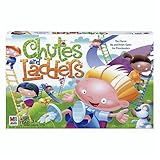 Chutes & Ladders |
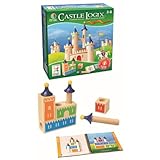 Castle Logix |
 The Sneaky Snacky Squirrel Game |
 Richard Scarry Busy Town |
 Dr. Suess What’s in the Cat’s Hat? |
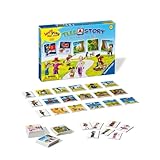 Tell-A-Story from Ravensburger |
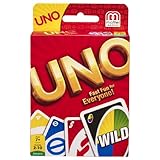 Uno |
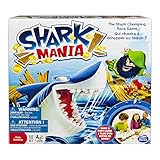 Shark Mania |
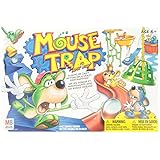 Mouse Trap |
School Age (Ages 6 to 9)
School age children are often the easiest to work with in a clinical setting. They can sit and concentrate for longer periods of time, and they are developing an awareness of the behavior that you’re trying to help to change, perhaps even the process of change itself. But this age group can also be the trickiest to motivate for home-based practice. 6 to 9 year olds are, generally speaking, “tough customers” (especially for their parents) when it comes to being amused. Apart from the games and materials I suggest below, another strategy for this age group is to use whatever non-screen-based activity your kid just loves to do. Whenever the chance presents itself, tell him that you’ll play that game with him if he agrees to practice speech and language goals with you, for at least part of the time you are engaged in the game or activity.
My favorite games and materials for school age kids are ones that challenge their problem solving skills. I’ve found that this almost always, in itself, is a huge motivator. Here are some titles, in no particular order, that I think you will have success with: Rory’s Story Cubes, Scrabble Jr., Mastermind, Don’t Say It, Stratego, Apples to Apples Kids, Clue, The Game of Life.
 Rory’s Story Cubes |
 Scrabble Jr. |
 Mastermind |
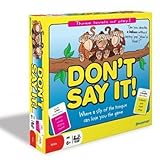 Don’t Say It |
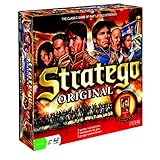 Stratego |
 Apples to Apples Kids |
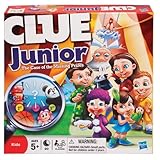 Clue |
 The Game of Life |
Pre-Adolescent (Ages 10 and Up)
For the oldest of these age groups, it is perfectly acceptable to have your children lead the home-based speech exercises. After all, some of these children, may not be as interested in direct one-on-one with a parent — sorry, we parents are just not THAT cool — and may be embarrassed to ask even a trusted friend to help them practice their speech. In addition, some of the children in this age range have been in speech therapy for years and may be extra sensitive to others’ awareness of their struggles, even if they’re making great progress. My primary suggestion for a parent considering letting a child “go it alone” is to maintain some kind of record of what the child is doing. This can be a check on a family fridge calendar or even a short recording or phone video (that can be deleted of course!) that a parent can observe to gauge progress. Also, a dedicated tool like Speech Buddies can be enormously motivating to a pre-teen in this solo, home-based practice; the tool itself can become the game, and the challenge of eliciting a sound they had previously struggled with, on their own, can be enough to fire them up. This is on the honor system of course but I think most of your pre-teens will actually be maximally motivated by the freedom the trust you’re placing in them and in being able to own their progress more.
Many pre-teens may still respond to dedicated play-based interactions at home to solidify speech behaviors. The theme is to challenge and compete with your pre-teen. I suggest dangling tangible rewards (like an outing to an ice cream spot or a home movie night) if your child is able to beat the goal one or more times in a given game. Also, If you want to break a game up into several home-based sessions, Ticket to Ride is a super fun game for kids at the older end of this range and Risk is another intense, classic game – just tabulate scores and set it up that way next time you play. Although I have never played Settlers of Catan, a colleague recently mentioned she has this game in her office and uses it frequently and to good effect with some of her pre-teen clients. Also, some of the classic, high-skill games like Scrabble can become interesting language-based games for pre-teens.
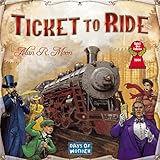 Ticket to Ride |
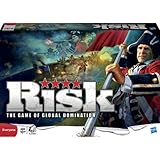 Risk |
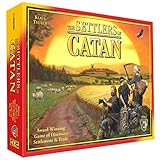 Settlers of Catan |
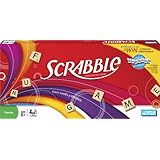 Scrabble |
Whatever games for practicing speech sounds you choose to use, make them: regular and consistent, play-based, and natural.


